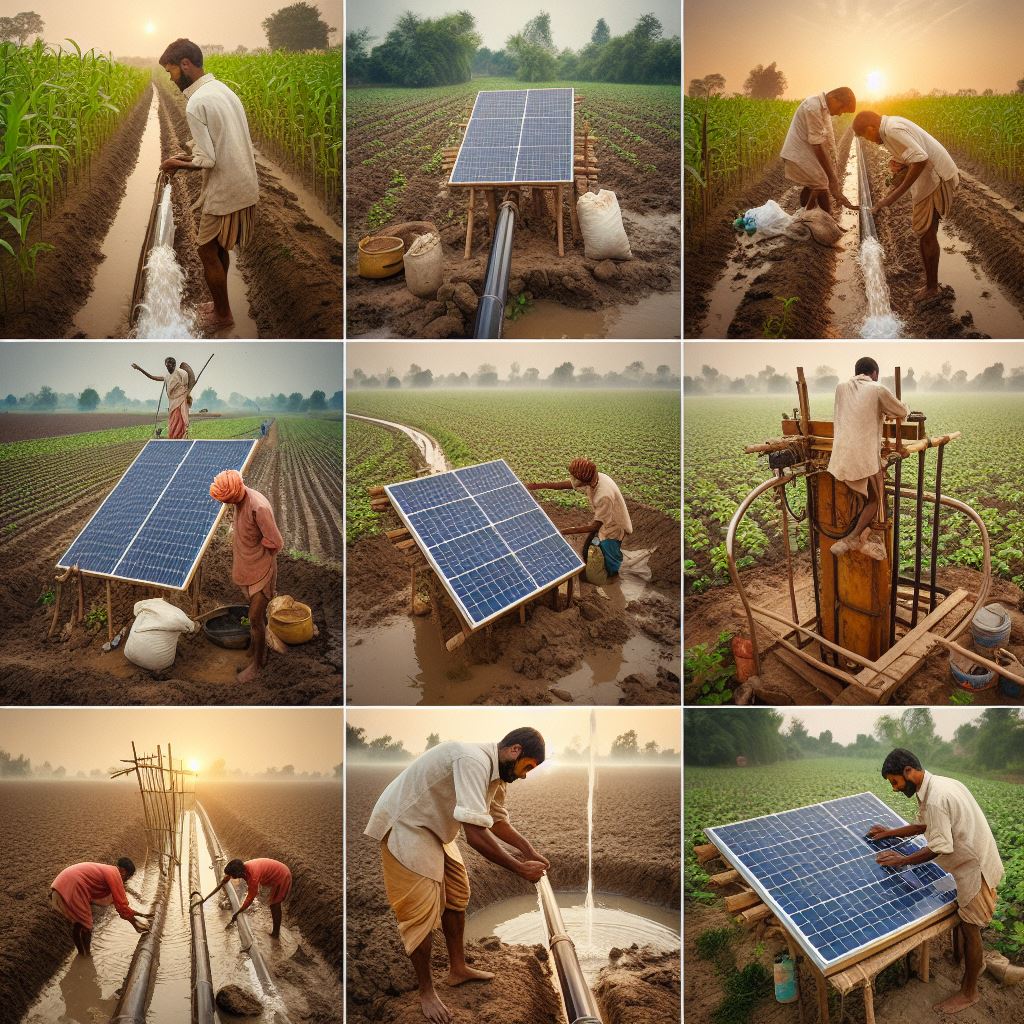Meta Description: Dive into the world of solar tubewells! Explore their, advantages, crucial considerations before installation, and frequently asked questions. Discover a sustainable and cost-effective path to water access.
Introduction
In an era where sustainability and resource conservation are at the forefront, Solar Tubewells are emerging as a revolutionary solution. These innovative systems harness the power of the sun to extract water from underground aquifers, offering a clean, reliable, and cost-effective alternative for various applications, particularly in agriculture and remote areas.

Understanding the Mechanism of Solar Tubewells
A Solar Tubewells system comprises several key components working in harmony:
- Solar Panels: These act as the heart of the system, converting sunlight into electricity through the photovoltaic effect. The efficiency and capacity of these panels significantly impact the overall system performance.
- Solar Inverter: This crucial component transforms the direct current (DC) electricity generated by the solar panels into alternating current (AC) electricity suitable for powering the pump.
- Submersible Pump: This pump, specifically designed for underwater operation, is lowered into the wellbore. It utilizes the AC electricity from the inverter to extract water from the aquifer.
- Controller: The brain of the system, the controller manages various functions, including system startup, shutdown, pump operation optimization, and protection against potential electrical faults.
How Do Solar Tubewells Work?
A Solar Tubewells system comprises several key components:
- Solar panels: These convert sunlight into electricity.
- Solar inverter: This converts the direct current (DC) electricity from the solar panels into alternating current (AC) electricity suitable for powering the pump.
- Submersible pump: This pump is lowered into the wellbore and utilizes AC electricity to extract water.
- Controller: This unit manages the entire solar charge controller system, ensuring optimal operation and protecting against potential damage.
Unveiling the Advantages of Solar Tubewells
- Harnessing the Power of Renewables: Solar energy, a clean and abundant resource, empowers these systems, minimizing reliance on fossil fuels and their associated environmental consequences.
- Reduced Operational Costs: While the initial investment exists, solar tube wells offer significant long-term savings on energy bills compared to traditional grid-powered or diesel-powered pumps. Over time, the cost savings can significantly outweigh the initial investment.
- Ensuring Reliable Water Access: Unlike conventional pumps dependent on grid connectivity, solar tube wells function independently, guaranteeing a consistent water supply even in areas with unreliable or limited access to electricity.
- Embracing Environmental Sustainability: By eliminating harmful emissions associated with fossil fuel-based pumps, solar tubewells contribute to a cleaner environment and a healthier planet.
- Minimizing Maintenance Requirements: Compared to traditional pumps, solar tubewells require minimal maintenance, reducing operational costs and downtime associated with frequent servicing.
Solar Tubewells Price in Pakistan for 2023
In Pakistan, solar tubewell prices can vary depending on a variety of factors, including the size of the tubewell pump, the type of mounting structure, and the type of solar system. For different sizes of tubewell pumps, we’ll discuss the solar tubewell price in Pakistan in this article.
| Tubewell Size in HP | Estimated price with L2 Structure | Estimated Price with Pole Mounting Structure |
| 3-HP | Rs.520,000 | Rs.690,000 |
| 5-HP | Rs.790,000 | Rs.1,080,000 |
| 10-HP | Rs.1,420,000 | Rs.1,820,000 |
| 15-HP | Rs.2,160,000 | Rs.2,650,000 |
3-Hp Solar Tubewells Price in Pakistan
Approximately 3 kW of solar power is required to power a 3-HP solar tubewell pump. The system includes 6 solar panels with a capacity of 500 watts each, a 5kW variable frequency drive, and supporting structures.
With an L2 structure, a 3-HP solar tubewell in Pakistan costs approximately Rs. 520,000, and it can cost as much as Rs. 690,000 with a pole-mounted structure.
- Price of three-HP solar tube wells with L2 structures in Pakistan: Rs.520,000
- The price of a 3-HP solar tubewell in Pakistan with a pole mounting structure is Rs.690,000

5-HP Solar Tubewells Price in Pakistan
Approximately 5 HP solar tube well pumps are the most common solar tubewell pumps in Pakistan. A 5 HP solar tube well pump can supply sufficient electricity to most farmers in Pakistan, except those with extensive land holdings. Ten solar panels with a capacity of 545 watts, a 5 kW VFD (Variable Frequency Drive), and mounting structures are required to install a 5-HP solar tubewell pump.
A 5-HP solar tubewell costs approximately Rs. 790,000 in Pakistan but can reach Rs. 1,080,000 with additional mounting structures.
- The cost of a 5-HP solar tubewell in Pakistan with an L2 structure is Rs. 790,000.
- The price of a 5-HP solar tubewell in Pakistan with a pole mounting structure: is Rs. 1,080,000.
10-HP Solar Tubewells Price in Pakistan
The cost of a 10-HP solar tubewell pump in Pakistan is approximately Rs. 1,420,000. Some Pakistani landowners own vast acreages of land, which requires a higher-power pump.
Depending on the mounting structure that you choose, the solar tubewell price in Pakistan may increase to Rs. 1,820,000. This price includes 18 solar panels, an 11 kW VFD (Variable Frequency Drive), and an L2 mounting structure.
- The price of a 10-HP solar tubewell with an L2 structure in Pakistan is Rs. 1,420,000.
- Price of a 10-HP solar tubewell in Pakistan with pole mounting structure: Rs. 1,820,000
15-HP Solar Tubewells Price in Pakistan
You can water your land with a 15-HP solar tubewell pump if you have more than 20 acres of land. Alpha Solar’s solar tubewell system will provide ample energy to irrigate your crops throughout the year at no additional cost. The 15-HP solar tube well pump allows you to harness solar energy and convert it into electricity for the pump to function and to draw water from the ground for irrigation.
The price of a 15-HP solar tube well in Pakistan begins at Rs. 2,160,000 and can reach Rs. 2,650,000 if a pole mounting structure is installed.
- The price of a 15-HP solar tubewell with an L2 structure in Pakistan is Rs. 2,160,000.
- The price of a 15-HP solar tubewell with pole mounting structure in Pakistan is Rs. 2,650,000.
Factors to Consider Before Installing a Solar Tubewell System
Making informed decisions before installing a solar tubewell system is crucial for optimal performance and long-term satisfaction. Here are key factors to consider:
- Water Depth Assessment: The depth of the water table in your location is a critical factor. It determines the required pump capacity and influences the overall system design to ensure efficient water extraction.
- Water Requirement Analysis: Understanding your specific water needs, whether for agricultural irrigation, household use, or livestock watering, is essential. This information helps determine the size of the solar panel array and select the appropriate pump capacity to meet your water demands.
- Sunlight Availability Evaluation: As sunlight is the primary energy source, analyzing your location’s average daily sunshine hours is crucial. Sufficient sunlight exposure is necessary for the system to generate adequate power and function effectively.
- Budgetary Considerations: The initial investment for a solar tubewell system can vary depending on factors like system size, pump capacity, brand of components, and potential government subsidies or financing options available in your region.
Exploring Government Incentives:
Many governments offer incentives and subsidies to promote the adoption of renewable energy technologies, including solar tubewells. Farmers are encouraged to explore available schemes that may include:
- Financial assistance for equipment purchase and installation.
- Tax credits or rebates for renewable energy investments.
- Subsidized loan programs with favorable terms for renewable energy projects.
- Technical assistance and training programs to support adoption and implementation.
Selecting the Right Solar Tubewell System for Your Needs
Choosing the appropriate solar tubewell system requires careful consideration of various factors to ensure it meets your specific requirements and operates efficiently. Here’s a breakdown of key aspects to guide your selection process:
1. System Sizing:
- Pump Capacity: The pump capacity, measured in horsepower (HP), determines the volume of water the system can extract per unit of time. This selection depends on your water requirements and the wellbore depth. Consulting with a qualified installer or hydrogeologist is recommended to determine the optimal pump capacity for your specific needs.
- Solar Panel Array Size: The size of the solar panel array directly impacts the amount of electricity generated to power the pump. Factors like pump capacity, desired daily water extraction, and local sunlight availability influence the required panel size. A qualified installer can help design a system that meets your energy demands based on these factors.
2. Component Selection:
- Solar Panels: Choose high-quality, efficient solar panels from reputable brands to ensure optimal performance and long-term durability. Consider factors like warranty coverage and power output per square meter when making your selection.
- Submersible Pump: Select a pump specifically designed for solar applications, ensuring compatibility with the system’s inverter and offering efficient operation under varying water depths.
- Inverter: Choose an inverter with the appropriate capacity to handle the power output from the solar panels and efficiently convert it to AC electricity for the pump.
3. Additional Considerations:
- Battery Backup (Optional): While not essential for all applications, integrating a battery backup system can provide additional security and ensure water access during periods of limited sunlight.
- Monitoring System: Consider installing a monitoring system to track the system’s performance, monitor water extraction levels, and identify potential issues promptly.
- Warranties and Guarantees: Ensure the chosen system components come with comprehensive warranties from reputable manufacturers to safeguard your investment.
Finding a Qualified Installer
Partnering with a qualified and experienced solar tubewell installer is crucial for successful system implementation and optimal performance. Here are some tips for finding a reliable installer:
- Seek referrals: Ask friends, neighbors, or agricultural professionals for recommendations on reputable solar tubewell installers in your area.
- Research online: Look for companies with a strong online presence, positive customer reviews, and certifications from relevant industry organizations.
- Compare quotes: Obtain quotes from multiple installers, comparing their proposed system designs, component specifications, pricing, and warranty offerings.
- Ask questions: During consultations, don’t hesitate to ask detailed questions about the proposed system, installation process, maintenance requirements, and after-sales support.

FAQs
How much does a solar tubewell cost?
The cost of a solar tubewell system can vary depending on several factors, including the size of the system, pump capacity, and brand of components. However, the initial investment can be offset by significant long-term savings on energy bills.
How much maintenance do solar tubewells require?
Solar tube wells generally require minimal maintenance compared to traditional pumps. Regular cleaning of the solar panels and periodic inspections are recommended.
Can solar tube wells be used in all locations?
While sunlight availability is a crucial factor, advancements in solar technology have made solar tube wells viable in various regions with sufficient sunshine hours.
Are there any government incentives for installing solar tube wells?
Several governments and organizations offer subsidies or financial assistance programs to encourage the adoption of solar technologies, including solar tubewells.
How long does a solar tubewell last?
Solar panels typically have a lifespan of 25–30 years, while the pump and other components may require replacement after 10–15 years, depending on usage and maintenance practices.
Where can I find a qualified installer for a solar tubewell?
Research reputable companies specializing in solar water pumping solutions in your area. Look for companies with experience in designing and installing solar tubewell systems suitable for your specific needs.
Conclusion
Solar tube wells represent a significant advancement in water pumping technology, offering a sustainable, cost-effective, and reliable solution for various applications. By harnessing the power of the sun, these systems empower communities and individuals to access clean water while minimizing their environmental footprint. As technology continues to evolve and costs become more competitive, solar tube wells are poised to play an increasingly vital role in securing water security for future generations.
